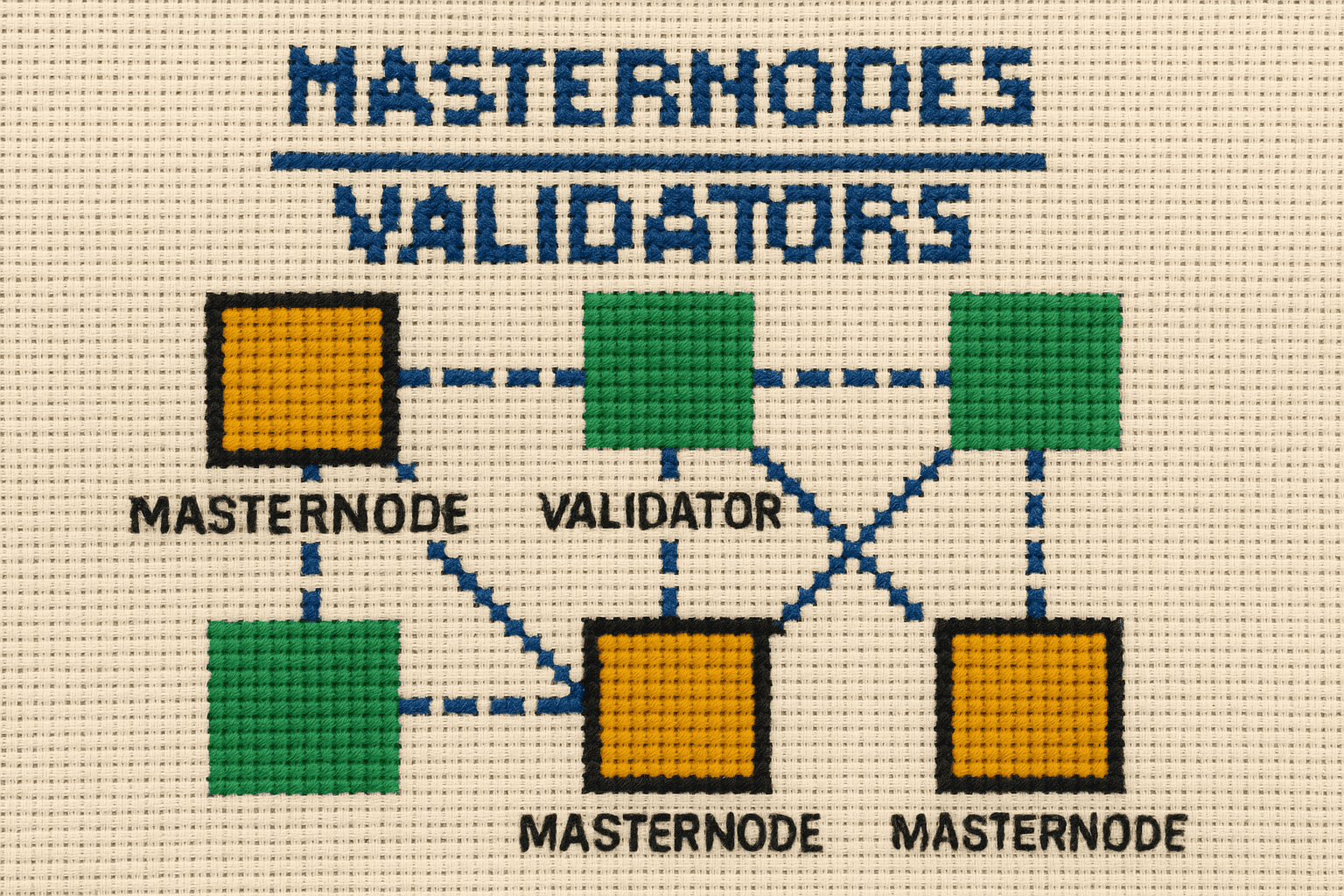Masternodes and validators: What is the difference?

As blockchain technology evolves, the importance of network infrastructure continues to grow, and at the heart of this infrastructure lie nodes in cryptocurrency. While many crypto users focus on trading or investing, understanding what a crypto node does and the difference between types like validators and masternodes is essential for grasping how blockchain systems function.
What is a node in cryptocurrency?
A node in crypto refers to any computer that participates in a blockchain network by storing a copy of the blockchain and helping verify and relay transactions. These cryptocurrency nodes play a crucial role in maintaining decentralization, ensuring network consensus, and protecting data integrity.
There are various types of crypto nodes, including full nodes, light nodes, validator nodes, and masternodes. Each serves a specific purpose within the network’s design and consensus mechanism.
Why nodes matter in blockchain
The importance of nodes in cryptocurrency cannot be overstated. Nodes ensure that all transactions are valid, enforce the rules of the protocol, and maintain the ledger’s accuracy. They also help propagate new transactions and blocks throughout the network, keeping the blockchain synchronized.
Understanding how crypto nodes work gives deeper insight into what makes blockchain secure and trustless. They eliminate the need for centralized control, making decentralized finance (DeFi) and other applications possible.
Understanding different types of crypto nodes
Not all nodes perform the same tasks. While full nodes store the entire blockchain and validate blocks, light nodes only download essential data and depend on full nodes for verification. Masternodes and validators, on the other hand, have more specialized responsibilities that go beyond standard node functions.
There are also trading nodes or crypto trading nodes, which may refer to nodes used in algorithmic or automated trading systems, although they are not part of blockchain consensus mechanisms directly. These typically operate within trading bots or platforms rather than the blockchain layer itself.
What is a validator node?
A validator node is a type of full node that actively participates in the blockchain consensus mechanism, especially in proof-of-stake (PoS) and its variants. Validators are responsible for proposing and validating new blocks. To become a crypto validator, a user typically must lock up a certain amount of cryptocurrency (staking), which acts as a financial incentive to behave honestly.
In blockchain technology, a validator node helps secure the network by ensuring that all transactions in a block follow the protocol’s rules. Validators are selected based on their stake, uptime, and reputation, depending on the blockchain design.
Role and responsibilities of crypto validators
Validators perform several critical functions:
- verifying the accuracy of transactions within blocks;
- proposing new blocks for addition to the blockchain;
- participating in consensus to achieve agreement across the network;
- monitoring network health and ensuring synchronization;
- maintaining node uptime and hardware performance.
By doing this, they uphold trust within decentralized systems without requiring a central authority. Crypto validation is often rewarded with transaction fees and block rewards, making it a profitable activity for those with the required resources and technical skill.
Exploring masternodes in cryptocurrency
A masternode is another specialized type of cryptocurrency node, introduced by the Dash blockchain and later adopted by many other networks. Unlike validator nodes, masternodes do not propose new blocks but instead provide important services that enhance the blockchain’s functionality.
These services include instant transactions, privacy-focused operations, and governance functions like voting on project proposals. Masternodes require a significant collateral in the network’s native token, which must remain locked to operate the node.
Running a crypto masternode gives participants access to a share of block rewards and governance rights, making it appealing for long-term investors.
Validator nodes vs masternodes: What’s the difference?
Although both validator nodes and masternodes support blockchain networks, they serve different functions. Validators are deeply tied to consensus and the block creation process. In contrast, masternodes operate at a secondary layer, enhancing network features and providing governance.
There are also key differences in technical design. Validator nodes are used primarily in PoS or DPoS blockchains, while masternodes are more common in networks with additional services beyond basic transaction validation. Masternodes often require a fixed number of coins to be locked, while validators are chosen dynamically based on staking metrics.
Another distinction lies in participation. Validator nodes usually require constant monitoring and maintenance to stay online, while masternodes may be more passive once set up, though uptime is still important.
How to become a crypto node operator
To become part of a blockchain’s infrastructure, one must understand the requirements for setting up a cryptocurrency node. This includes acquiring the necessary hardware, storage, and technical knowledge, as well as locking collateral if running a validator or masternode.
Here’s a quick comparison of what’s involved:
- Validator node requires staking funds, setting up secure infrastructure, maintaining high uptime, and running consensus software. Often requires deep technical knowledge and involvement in the validation process.
- Masternode requires fixed collateral in tokens, running the node software, maintaining server availability, and sometimes participating in governance or community voting.
The decision between the two depends on one’s technical ability, risk tolerance, capital, and time commitment.
Earning and trading strategies with crypto nodes
Running a crypto node — whether a validator or masternode — can generate passive income. In return for supporting the network, node operators receive regular rewards, often denominated in the native cryptocurrency. These rewards can be re-staked, exchanged, or used for governance participation.
Common strategies include:
- Choosing networks with high return rates and sustainable tokenomics.
- Diversifying across multiple node types or blockchains to reduce risk.
- Monitoring network health and reward trends for optimal reinvestment.
- Participating in early-stage node opportunities for higher returns.
While rewards are attractive, users should also consider hardware costs, token price volatility, and potential regulatory implications.
Operating a crypto node is not just about earning rewards — it’s also about contributing to the integrity and decentralization of the blockchain ecosystem. Whether you’re running a validator node to secure consensus or a masternode to enable advanced network features, your participation helps strengthen the infrastructure of decentralized networks.
Over time, experienced node operators often refine their strategies, automate monitoring tools, and stay engaged with protocol updates to maintain profitability and reliability. As the DeFi space and blockchain technology evolve, running a node can become both a rewarding technical challenge and a meaningful long-term investment.
Conclusion: the future of crypto nodes
Crypto nodes will continue to be essential components of blockchain networks. As more blockchains move toward energy-efficient consensus models like PoS, the demand for validator nodes will likely grow. Meanwhile, masternodes will evolve to support new services and governance models in next-generation blockchains.
In summary, validator nodes focus on consensus and block validation, while masternodes support advanced features and governance. Both play key roles in decentralization, security, and functionality. Understanding these roles not only deepens knowledge of blockchain infrastructure but also opens up new paths for earning from crypto nodes and contributing to the ecosystem’s growth. Platforms like ironwallet.io make it easier to access and manage these node-based rewards securely.










